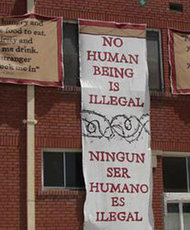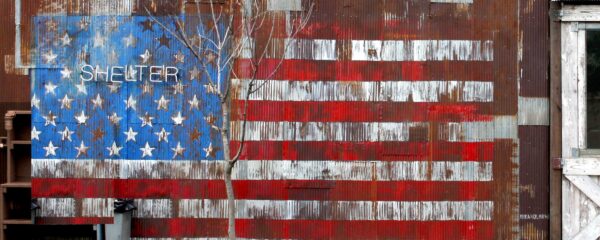Hazleton, PA Anti-Immigrant Law Is Unconstitutional, Federal Appeals Court Rules

The U.S. Court of Appeals for the Third Circuit today issued a sweeping decision striking down as unconstitutional the city of Hazleton's law that would punish landlords and employers who are accused of renting to or hiring anyone the city classifies as an "illegal alien."
FOR IMMEDIATE RELEASE
CONTACT: (212) 549-2666; media@aclu.org
PHILADELPHIA – The U.S. Court of Appeals for the Third Circuit today issued a sweeping decision striking down as unconstitutional the city of Hazleton's law that would punish landlords and employers who are accused of renting to or hiring anyone the city classifies as an "illegal alien."
The case, Lozano v. Hazleton, has been closely watched across the country because the Hazleton ordinance has served as a model for similar laws nationwide and was challenged by civil rights groups in a lengthy trial. The suit has been underway for more than four years in the federal district and circuit courts. Today's unanimous appeals court decision is the latest legal victory against discriminatory state and local laws that target immigrants and invite racial profiling against Latinos and others who appear "foreign." Many cities like Fremont, Nebraska and Summerville, South Carolina have voluntarily tabled or blocked these laws under legal pressure and local opposition.
"This is a major defeat for the misguided, divisive and expensive anti-immigrant strategy that Hazleton has tried to export to the rest of the country," said Omar Jadwat, a staff attorney with the American Civil Liberties Union Immigrants' Rights Project. "The Constitution does not allow states and cities to interfere with federal immigration laws or to adopt measures that discriminate against Latino and immigrant communities."
Hazleton adopted its first anti-immigrant ordinance in August 2006. A civil rights coalition including the ACLU, the ACLU of Pennsylvania, LatinoJustice PRLDEF, the Community Justice Project and the law firm Cozen O'Connor immediately filed a lawsuit challenging the law on behalf of Hazleton residents, landlords and business owners. Today's ruling upholds a July 2007 ruling by the U.S. District Court for the Middle District of Pennsylvania concluding that the Hazleton ordinances were preempted by federal law governing immigration.
"Hazleton's discriminatory law decimated a town that used to be bustling with life and commerce," said Vic Walczak, Legal Director of the ACLU of Pennsylvania and a lead attorney in the case. "Divisive laws like these destroy communities and distract from the very real problems that local governments are facing across the country. Immigration reform needs to come from the federal level. Local ordinances like these have a toxic effect on the community, injecting suspicion and discriminatory attitudes where they didn't previously exist."
During the trial, Hazleton officials claimed that undocumented immigrants were responsible for bankrupting the city, driving up healthcare costs and increasing local crime. In fact, the evidence at trial showed that from 2000-2005, Latino immigrants actually helped to transform a huge city budget deficit into a surplus, that the private hospital system made a $4 million profit and that the crime rate actually fell.
"The Latino plaintiffs who brought this lawsuit knew this law was intended to drive them out of Hazleton," said Cesar Perales, President and General Counsel of LatinoJustice PRLDEF. "The court clearly recognized this danger."
Friend-of-the-court briefs opposing the Hazleton law were filed by numerous civil rights, religious, labor and business organizations, including the U.S. Chamber of Commerce, the labor union coalition Change to Win, the American Jewish Committee, Capuchin Franciscan Friars, Lutheran Children and Family Services, the Friends Committee on National Legislation, Legal Momentum, the Lawyers' Committee for Civil Rights Under Law, the Southern Poverty Law Center, the Asian Pacific American Legal Center, the Anti-Defamation League and the Mexican American Legal Defense and Educational Fund.
Related issues involving state authority to enact laws addressing immigrant employment are pending before the Supreme Court in the case, Chamber of Commerce v. Whiting, brought by the ACLU and other groups challenging an Arizona statute.
Attorneys on the case include Jadwat, Lucas Guttentag, Jennifer Chang Newell and Lee Gelernt of the ACLU Immigrants' Rights Project; Walczak and Mary Catherine Roper from the ACLU of Pennsylvania; Shamaine Daniels of the Community Justice Project; Foster Maer, Ghita Schwarz and Jackson Chin of LatinoJustice PRLDEF; and Thomas G. Wilkinson and Ilan Rosenberg of Cozen O'Connor.
The ruling is online at: www.aclu.org/immigrants-rights/lozano-v-hazleton-opinion
A video with interviews with ACLU attorneys and clients is online at:
More information on the case, Lozano v. Hazleton, is online at:
More information on the case, Chamber of Commerce v. Whiting, is online at: www.aclu.org/immigrants-rights/chamber-commerce-v-candelaria

